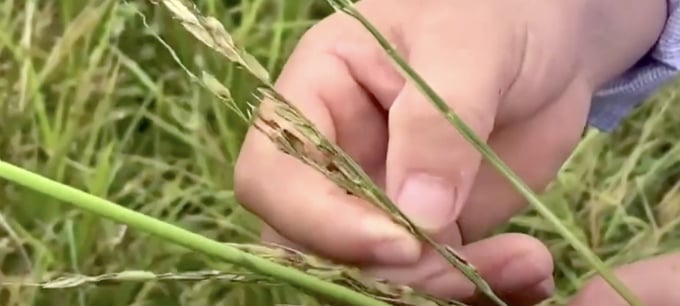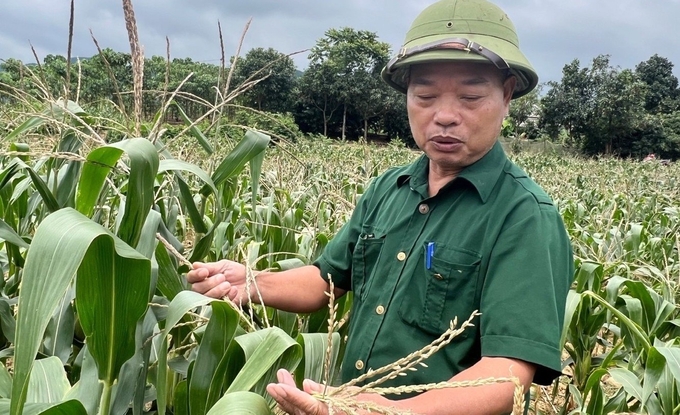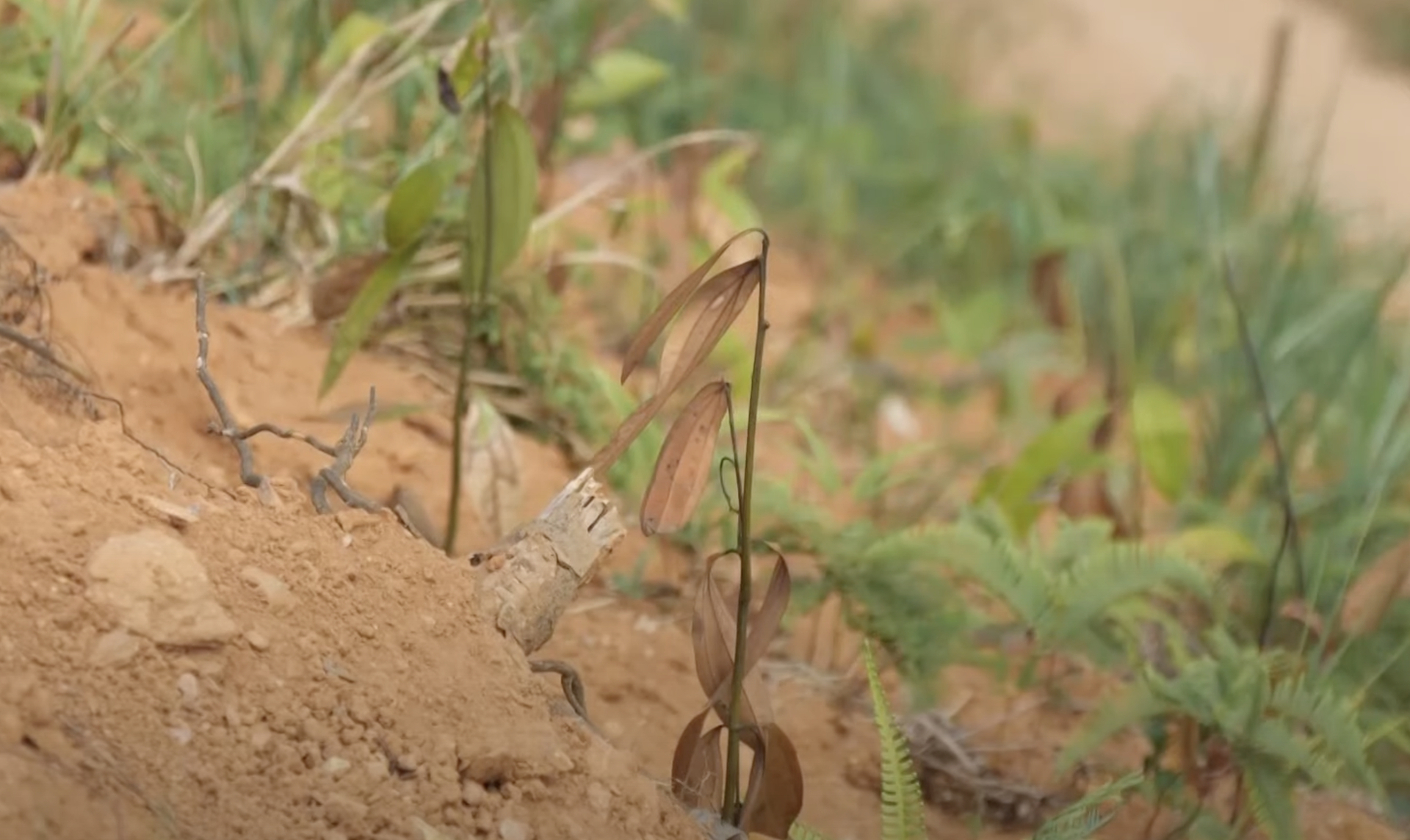May 21, 2025 | 09:56 GMT +7
May 21, 2025 | 09:56 GMT +7
Hotline: 0913.378.918
May 21, 2025 | 09:56 GMT +7
Hotline: 0913.378.918

Multiple rice production area in the highlands of Lao Cai province were damaged by the heat and water shortgae. Photo: Hai Dang.
The recent heatwaves and water shortage have caused substantial damage to agricultural production as well as the people's lives in Lao Cai province. According to statistics compiled from January 1 to the end of June 2023, the total crop production area damaged by heatwaves and water shortage in Lao Cai province was at least 11,500 hectares, with a total damage value of nearly 752 billion VND.
Additionally, heatwaves and water shortage have caused damage to the quality of crops, especially rice and maize. Farmers were forced to replant many crops multiple times after being lost. Several crop production areas have reported a significant decline in their productivity and yield, which has directly affected people's lives in the remote areas of Lao Cai province.
According to Mr. Hoang Quoc Khanh, Vice Chairman of Lao Cai Provincial People's Committee, the province aims to provide local people with assistance through trying times, compensate a portion of the lost labor and costs of materials including seeds, fertilizers, etc. Additionally, the province will partially fund the local production recovery and livelihood stabilization. Accordingly, Lao Cai Provincial People's Committee issued Plan No. 304/PA-UBND on July 17 addressing support for local crop production areas that are damaged heatwaves and water shortage.
The beneficiaries of support for damage caused by heatwaves and water shortage will be households and individuals with crop production areas under the local government's master plan, schedule and guidelines for agricultural production.

Multiple maize producton areas in Lao Cai province were damaged by drought and water shortage. Photo: Thanh Tien.
The level of support for crop production areas damaged by heatwaves and water shortage complies with the Government's Decree No. 02/2017/ND-CP dated January 9, 2017. Accordingly, production areas with damage levels below 70% will not be supported. Local farmers are encouraged to take the initative in restoring crop production areas with damage levels below 70% as well as areas of perennial and annual crops.
Approximately 2,208 hectares of seedling, rice, corn and vegetables with damage levels above 70% will receive a total remedial support budget of nearly 4.7 billion VND. This fund is drawn from the district-level budget reserves, socialization funding and other district-level legal funding sources.
In the event that the total damage exceeds the capacity of a district, Lao Cai province will consider drawing fund from the provincial budget reserve. According to this support plan, the People's Committees of districts, towns and cities are required to review, compile statistics and accurately summarize data on the damaged crop production area; adjust and supplement data in the plan and take responsibility for the data on crop production areas damaged by heatwaves and water shortage.
Additionally, the province will organize the remedial support in accordance with the order, procedures, targets and support norms as prescribed under the Government's Decree No. 02/2017/ND-CP dated January 9, 2017 in order to ensure equity, transparency, and efficiency.
According to Vice Chairman of Lao Cai Provincial People's Committee, this agency has requested the People's Committees of various districts, towns and cities to guide the transformation of the crop structure with a focus on adaptability to climate change. Moreover, local governments have been asked to prepare human resources, materials, means and equipment to promptly respond to the weather and natural disasters that affect agricultural production.
Farmers are instructed to extend the transplanting window or to switch crops on fields that are at risk of drought and water shortage. Regarding the transplanted rice area, farmers should focus on nurturing, preventing pests and diseases, applying adequate and balanced fertilizers, and supplementing with potassium to facilitate crops' growth. In addition, farmers have been advised to increase the frequency of their field visits, and detect harmful pests and diseases early in order to take control measures against small rice leaffolders, blast diseases, etc. These efforts will contribute to a safe and effective production process.
On the other hand, units responsible for the management of irrigation infrastructure are subject to stricter inspection and examination. Local governments will guide its people in taking measures to save water as well as utilize water sources effectively, which will help prevent water shortage and waste.
Regarding maize production, farmers have been advised to replant areas damaged by heatwaves and water shortage; expand the area of intercropping, increase crops on suitable soil types to offset the loss caused by heatwaves and water shortag. Furthermore, farmers should focus on intensive farming to increase the productivity and quality of crops, and expand the production area for the 2023 winter crop.

One-year-old cinnamon tree heavily damaged by the heatwaves in Bao Yen district, Lao Cai province. Photo: Hai Dang.
Farmers in lowland seasonal rice production areas will maintain and expand the field area of a single rice variety in order to utilize the System of Rice Intensification (SRI). The system will reduce the number of varieties, reduce the usage of fertilizer, and save irrigation water. Consequently, the rice will benefit from increased productivity, quality and value.
According to Mr. Le Thanh Hoa, Head of Muong Khuong district's Division of Agriculture and Rural Development, the district has received six tons of maize seed from the national reserve to support farmers with the summer-autumn crop. Additionally, the district plans to support production areas with damage levels above 70% by drawing from the district budget reserve or socialization funding. However, as an impoverished district with a limited budget reserve, Muong Khuong district is proposing to request aid from the province budget reserve.
Muong Khuong district lost over 60 billion VND worth of agricultural production due to heatwaves and drought. However, production areas with damage levels above 70% only lost over 3 billion VND.
Lao Cai province also directed its Department of Agriculture and Rural Development to guide the district People's Committee during the implementation of the support plan; adjust agricultural production in response to the weather and climate; report and propose to the Provincial People's Committee to promptly resolve issues.
Lao Cai province received 25.5 tons of corn seeds from the national reserve in 2023. These seeds are subsequently distributed to the districts for free to support replanting. Additionally, the seeds will help compensate the production areas damaged by drought in the 2023 spring-summer crop.
In addition, the province have actively deployed action plans during heatwaves in order to prevent and overcome damages caused by the drought; ensure water for spring rice and seasonal rice production in the highlands; mobilize the forest rangers to facilitate forest fire prevention and fighting; ensure the supply of food, drinking water, medicines for livestock and poultry.
As a result of the El Nino, heatwaves and water shortage in production and daily life were a common occurrence throughout Lao Cai province. The province reported three prolonged heat waves during the first six months of 2023 with an average temperature ranging from 37 to 39 degrees Celsius. Most notably, the temperature in Lao Cai city reached 40.5 degrees Celsius on May 21, 2023.
Conversely, the rainfall in April, May and June saw a decrease of 38 to 58% compared to previous years, causing water shortage in agricultural production.
Translated by Nguyen Hai Long

(VAN) In 2024, over 295 million people across 53 countries and territories faced acute hunger—an increase of almost 14 million people compared to 2023, while the number of people facing catastrophic levels of hunger reached a record high.

(VAN) World Environment Day 2025 (June 5) carries the theme 'Beat Plastic Pollution' continuing to emphasize the global urgency of addressing the plastic waste crisis.

(VAN) This was the assessment shared by experts at the workshop titled 'Assessing the Role and Potential of Low-Emission Rice Production Systems in Vietnam,' held on the morning of May 19.

(VAN) Cai Rong Port is the fisheries control center of Quang Ninh, helping to monitor fishing vessels, combat IUU fishing, and remove the EC's 'yellow card'.

(VAN) The German Agricultural Society (DLG) explores the possibility of establishing a mechanization service center in Vietnam’s Mekong Delta to support farmers in accessing and utilizing advanced machinery.

(VAN) On May 16, the Department of Water Resources Management, in collaboration with the Food and Agriculture Organization of the United Nations (FAO), held a signing ceremony for the GEF-8 project document.

(VAN) Food safety, mechanization, vocational training, and market opening are key areas of cooperation expected between the Vietnamese Government and the Federal Republic of Germany.